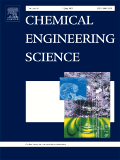
CHEMICAL ENGINEERING SCIENCE
Scope & Guideline
Transforming Ideas into Solutions for a Sustainable Future
Introduction
Aims and Scopes
- Chemical Process Engineering:
Research on the design, optimization, and control of chemical processes, including batch and continuous operations, with a strong focus on process intensification and sustainability. - Reaction Engineering:
Investigation of reaction kinetics, mechanisms, and reactor design, particularly for catalytic processes, including the development of new catalysts and their performance in various reactions. - Separation Processes:
Studies involving mass transfer operations such as distillation, absorption, extraction, and membrane processes, aimed at enhancing efficiency and selectivity in separation techniques. - Transport Phenomena:
Research on the behavior of momentum, heat, and mass transfer in various systems, including fluid dynamics in reactors, microfluidics, and complex multiphase flows. - Sustainable Chemical Engineering:
Focus on green chemistry and engineering principles, including waste minimization, resource recovery, and the development of renewable energy technologies. - Materials Science:
Exploration of novel materials for applications in catalysis, energy storage, and environmental remediation, with an emphasis on structure-property relationships. - Machine Learning and Data-Driven Approaches:
Application of machine learning techniques to model complex chemical processes, optimize operations, and predict outcomes based on experimental data.
Trending and Emerging
- Advanced Materials for Catalysis:
Research is increasingly focusing on the development of advanced materials, such as metal-organic frameworks (MOFs) and nanostructured catalysts, which enhance catalytic performance and selectivity. - Sustainable and Green Chemistry:
There is a growing trend towards sustainable practices in chemical engineering, including the development of green solvents, waste valorization processes, and methods that minimize environmental impacts. - Integration of Machine Learning and AI:
The integration of machine learning and artificial intelligence in chemical engineering research is on the rise, with applications in process optimization, predictive modeling, and real-time monitoring. - Microfluidics and Miniaturized Systems:
The use of microfluidic systems for various applications, including reaction engineering and material synthesis, is gaining momentum, reflecting a trend towards miniaturization and increased efficiency. - Environmental Remediation Technologies:
Research focusing on innovative technologies for environmental remediation, including advanced oxidation processes and the use of bio-based adsorbents, is becoming more prominent. - CO2 Utilization and Carbon Capture:
With growing concerns over climate change, there is a significant increase in research aimed at CO2 capture technologies and its conversion to valuable products.
Declining or Waning
- Traditional Chemical Process Simulation:
There has been a noticeable decline in papers focused solely on traditional simulation methods without integrating advanced data-driven or machine learning techniques. The field is moving towards more hybrid approaches that combine traditional methods with modern computational techniques. - Basic Unit Operations:
Research specifically centered on traditional unit operations (e.g., simple distillation, basic heat exchangers) seems to be less frequent, as the community shifts towards complex, integrated systems and novel applications. - Conventional Catalyst Development:
While catalyst development remains a vital area, there is a noticeable decline in studies focused on conventional catalysts without innovative modifications or new approaches, such as the integration of nanomaterials or hybrid systems. - Single-Phase Flow Dynamics:
Research on single-phase flow dynamics, particularly in simpler systems, is becoming less prominent, with a shift towards studying multiphase flows and their complexities.
Similar Journals

Frontiers of Chemical Science and Engineering
Driving Breakthroughs in Environmental SustainabilityFrontiers of Chemical Science and Engineering is an esteemed journal published by SPRINGER, dedicated to advancing the rapidly evolving domain of chemical engineering. Located in New York, USA, this journal provides a vibrant platform for disseminating groundbreaking research and innovative methodologies in the field. With an impressive Q1 ranking in Chemical Engineering and a Scopus ranking of 54 out of 273, it occupies a prominent position, reflecting its high impact and relevance among academic circles. Since its inception in 2011, it has fostered interdisciplinary collaboration, encompassing diverse topics such as process engineering, environmental sustainability, and nanotechnology, making it a vital resource for researchers, professionals, and students alike. The journal's open access policy further enhances accessibility, ensuring that cutting-edge research is readily available to a global audience. As the field continues to evolve, contributions to Frontiers of Chemical Science and Engineering play an essential role in shaping future advancements and empowering the next generation of engineers.
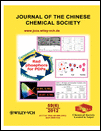
JOURNAL OF THE CHINESE CHEMICAL SOCIETY
Exploring the Frontiers of Chemical ScienceJOURNAL OF THE CHINESE CHEMICAL SOCIETY, published by WILEY-V C H VERLAG GMBH, is a vital resource in the field of chemistry, focusing on a broad array of topics pertinent to general chemistry and its advancing sub-disciplines. Established in 1954 and running through 2024, this journal serves as a significant platform for the dissemination of high-quality research, showcasing innovative findings and developments within the chemical sciences. With its Q3 category ranking and positioning at Rank #203 in General Chemistry per Scopus, it reflects the journal's commitment to research excellence and impact. While not an open-access publication, it ensures accessibility to a global audience, making it an essential tool for researchers, professionals, and students alike seeking to stay informed and engaged in the evolving landscape of chemistry.
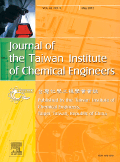
Journal of the Taiwan Institute of Chemical Engineers
Empowering global collaboration in chemical sciences.The Journal of the Taiwan Institute of Chemical Engineers is a prestigious publication in the field of chemical engineering and chemistry, published by Elsevier. With an impressive impact factor placing it in the top quartiles (Q1) of both the Chemical Engineering (miscellaneous) and Chemistry (miscellaneous) categories, this journal serves as a vital platform for disseminating cutting-edge research and innovative findings. Since its inception in 2009 and continuing through 2024, it has established a strong reputation with notable Scopus rankings—ranked 40th out of 273 in General Chemical Engineering and 62nd out of 408 in General Chemistry, reflecting the journal’s significance in its field. By offering open access options, the journal ensures that research is readily available to a global audience, fostering collaboration and knowledge exchange among researchers, professionals, and students. The Journal of the Taiwan Institute of Chemical Engineers is dedicated to advancing the discipline of chemical engineering and supporting the development of novel scientific methodologies and applications.

RUSSIAN JOURNAL OF APPLIED CHEMISTRY
Elevating Expertise in the Chemical SciencesRUSSIAN JOURNAL OF APPLIED CHEMISTRY, published by PLEIADES PUBLISHING INC, serves as a pivotal platform for advancing knowledge in the fields of chemical engineering and general chemistry. With an ISSN of 1070-4272 and an E-ISSN of 1608-3296, this journal has been in continuous publication since 1995 and is set to continue until 2024. Although it operates without an open access model, researchers can access a wealth of innovative research findings, critical reviews, and insightful discussions that reflect the current trends and challenges in applied chemistry. Its rankings place it in Q3 quartiles for both Chemical Engineering and Chemistry as of 2023, indicating its emerging influence within these disciplines. The Scopus rankings further highlight its relevance, positioning it in the lower percentiles, suggesting a fertile ground for researchers aiming to elevate the field. Engaging with this journal can enrich academic and professional understanding, making it an essential resource for anyone dedicated to furthering their expertise in applied chemistry.
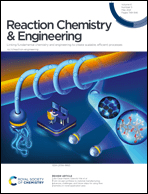
Reaction Chemistry & Engineering
Fostering Collaboration for Chemical Engineering ExcellenceReaction Chemistry & Engineering is an esteemed journal published by the Royal Society of Chemistry, dedicated to advancing the field of chemical engineering. With a focus on pivotal topics including catalysis, process technology, and fluid flow, this journal serves as a critical platform for researchers and professionals seeking to disseminate innovative findings and methodologies. As of 2023, it boasts impressive impact factors, ranking Q2 in Catalysis and consistently appearing in the Q1 categories for several related fields, thus recognizing its influence and relevance in the scientific community. With Scopus rankings placing it among the top 30 journals in multiple chemical engineering categories, Reaction Chemistry & Engineering encourages open dialogue and collaboration among scientists aiming to overcome contemporary challenges in chemical processes. This journal is vital for anyone involved in the development and application of chemical engineering, providing essential insights and fostering progress in this dynamic discipline. Explore the latest research and contribute to future innovations by engaging with the cutting-edge work presented in Reaction Chemistry & Engineering.

RSC Advances
Connecting Researchers to Transformative IdeasRSC Advances, published by the Royal Society of Chemistry, is a leading open-access journal that has been a prominent platform for cutting-edge research since its inception in 2011. Recognized globally for its rigorous peer-review process, RSC Advances serves the dynamic fields of Chemical Engineering and Chemistry, holding prestigious rankings within the top quartile of academic journals in both areas. With its impact factor reflecting a growing influence, the journal currently occupies the Q1 category in Chemical Engineering and Q2 in Chemistry as of 2023. Researchers and professionals will find RSC Advances an essential resource for innovative studies and applications that advance scientific knowledge. Additionally, as an open access journal since 2017, it affords wider visibility and accessibility to groundbreaking research, fostering collaboration and engagement in the scientific community. Situated in Cambridge, UK, RSC Advances remains committed to its objective of disseminating high-quality research that catalyzes progress across various disciplines.
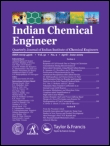
Indian Chemical Engineer
Elevating Standards in Chemical Engineering Research.Indian Chemical Engineer, published by Taylor & Francis Ltd, stands as a reputable journal in the field of chemical engineering, encompassing a wide range of topics pertinent to both academia and industry. With an ISSN of 0019-4506 and an E-ISSN of 0975-007X, this journal has been a key resource for researchers and professionals since its inception in 1992, undergoing a significant evolution from 2009 to 2024. Currently ranked in the Q3 category of chemical engineering (miscellaneous) in 2023, it reflects a dedicated commitment to disseminating innovative research and insights within the discipline. The journal is indexed in Scopus, achieving a rank of 148 out of 273, which denotes its growing influence in the field with a 45th percentile placement. Although currently not an open-access publication, it offers valuable content that contributes extensively to the advancement of chemical engineering research and education. Researchers, professionals, and students alike are encouraged to engage with this publication to stay at the forefront of industry advancements and academic discussions.
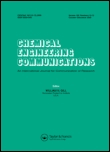
CHEMICAL ENGINEERING COMMUNICATIONS
Transforming Research into Real-World Applications.Chemical Engineering Communications, published by Taylor & Francis Inc, is a distinguished journal within the realms of Chemical Engineering and Chemistry. With an ISSN of 0098-6445, this journal plays a pivotal role in disseminating innovative research, critical reviews, and insightful discussions that encompass a broad spectrum of topics in these fields. The journal boasts a commendable Q2 ranking in the 2023 category of chemical engineering and general chemistry, reflecting its significant contribution to the scientific community. Operating under a rigorous peer-review process, the journal attracts high-quality submissions from global researchers. Although currently not an Open Access journal, it provides extensive archive access for users interested in exploring past advancements from its inception in 1973 through to 2024. With a commitment to advancing knowledge and fostering collaboration among academia and industry, Chemical Engineering Communications remains an essential resource for professionals and students aiming to stay abreast of the latest developments in chemical sciences.

THEORETICAL FOUNDATIONS OF CHEMICAL ENGINEERING
Elevating the Standards of Theoretical Chemical ResearchTHEORETICAL FOUNDATIONS OF CHEMICAL ENGINEERING is an esteemed academic journal published by PLEIADES PUBLISHING INC, dedicated to advancing the field of chemical engineering and chemistry through rigorous theoretical discourse and scholarly communication. With a history of publication dating back to 1974, the journal has been a vital resource for researchers and professionals, contributing to the foundation of knowledge in this multidisciplinary domain. Although it does not offer open-access options, it remains an essential platform for innovative research, boasting a 2023 ranking in the Q3 quartile for both Chemical Engineering and General Chemistry categories. The journal is indexed in Scopus, where it ranks #210 out of 273 in Chemical Engineering and #317 out of 408 in Chemistry, emphasizing its growing relevance within the scholarly community. Researchers, educators, and students alike can benefit from the insights and findings shared within its pages, making it a critical venue for those seeking to enhance their expertise in theoretical chemical engineering.

Green Chemical Engineering
Transforming chemical engineering with eco-friendly insights.Green Chemical Engineering, an esteemed journal published by KEAI PUBLISHING LTD, plays a pivotal role in advancing the field of sustainable chemical engineering. With an Open Access policy since 2020, this journal facilitates the free exchange of cutting-edge research and innovations that address critical environmental challenges. Based in China, it has rapidly gained recognition with impressive category quartiles, ranking Q1 in numerous relevant fields including Catalysis, Chemical Engineering (miscellaneous), Filtration and Separation, and Process Chemistry and Technology. Its presence in Scopus highlights its significance, with top rankings (e.g., Rank #4/19 in Filtration and Separation) placing it in the upper echelons of chemical engineering literature. Designed for researchers, professionals, and students alike, Green Chemical Engineering aims to foster a collaborative platform for the dissemination of pioneering work that contributes to a greener and more sustainable future.